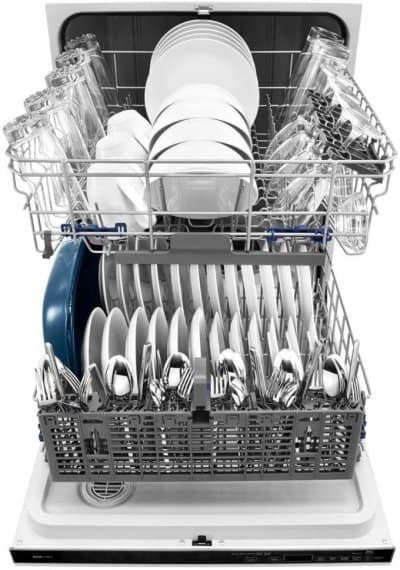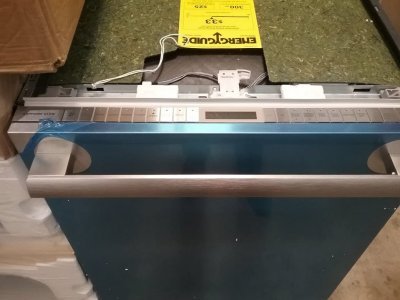If you are looking for an easy and efficient way to clean your dishes, a dishwasher is the way to go. However, simply throwing everything into the machine may not result in the most effective cleaning. In this article, we will provide you with tips and tricks on how to stack a dishwasher for maximum efficiency.
Table of Contents
Why It Matters How You Stack Your Dishwasher
Stacking your dishwasher properly can make a huge difference in the efficiency of your machine. The right placement of dishes and cutlery will ensure that each item is properly cleaned and dried. Additionally, properly stacking your dishwasher can help to conserve water and energy.
Preparing Your Dishes for the Dishwasher
Before loading your dishwasher, it is important to scrape off any food debris and rinse your dishes. This will help to prevent clogging and ensure that your dishwasher is not overworked. For tough-to-clean dishes, pre-soaking is a good idea.
Loading the Dishwasher
When loading your dishwasher, it is important to keep like items together. Plates should go in the bottom rack, while glasses, cups, and bowls should go on the top rack. Make sure that each item is facing down or towards the center, as this will help to ensure that they are properly cleaned.
Maximizing Space in Your Dishwasher
In order to get the most out of your dishwasher, it is important to maximize space. This can be done by using the right dishwasher racks and by stacking your dishes efficiently. For example, you can use a cup rack to hold your cups, freeing up space for other items.
Tips for Maintaining Your Dishwasher
In order to keep your dishwasher running efficiently, it is important to maintain it properly. This can be done by regularly cleaning the dishwasher, checking for clogs, and using the right dishwasher detergent.

Can I put pots and pans in the dishwasher?
Yes, you can put pots and pans in the dishwasher. However, it is important to check the manufacturer’s instructions first to ensure that they are dishwasher-safe. Some pots and pans may be coated with a special finish that could be damaged in the dishwasher, so it’s best to check before you put them in. Additionally, some pots and pans may need to be washed on a lower temperature or using a different cycle than your usual dishes. This is because they may require more intensive cleaning due to their size or material.
Do I need to use special detergent for my dishwasher?
Generally speaking, you do not need to use a special detergent for your dishwasher. Most regular dishwashing detergents are designed to be used in either a dishwasher or by hand washing. However, there are some advantages to using a special detergent designed specifically for dishwashers.
For one, these detergents often contain enzymes that help break down food particles and grease more effectively than regular detergents. This can help prevent residue from building up on dishes and in the dishwasher itself. Additionally, many of these special detergents are formulated with less phosphates than regular dishwashing detergents, which helps reduce water pollution.
If you want to get the most out of your dishwasher, using a specialized detergent can be helpful. However, if you don’t want to invest in a new type of detergent, you should still be able to get good results with regular dishwashing liquid.
How often should I clean my dishwasher?
Cleaning your dishwasher should be done on a regular basis to ensure it’s performing optimally. Depending on how often you use your dishwasher, you may want to clean it at least once a month. To do this, run an empty cycle with a cup of white vinegar placed on the top rack. This will help remove any built-up food particles or grease that have accumulated over time. Additionally, you can use a specialized cleaner designed for dishwashers to help dissolve any hard water deposits or soap scum that may have formed in the interior of the machine. Finally, make sure to check and clean the filter regularly to prevent clogs from occurring.
Can I put silverware in the dishwasher?
Yes, you can put silverware in the dishwasher. It is important to follow the instructions for your specific dishwasher, as some may have different settings or require special care for certain items.
When loading the dishwasher, try to separate silverware from other dishes and utensils. This will help prevent scratches and damage to other items in the dishwasher. You should also place silverware so that it is not touching any other objects, as this can cause discoloration or tarnishing of the metal.
If necessary, you may want to use a specialized cleaning solution designed specifically for silverware. This will help ensure that your silverware comes out looking shiny and new after each wash cycle.
Can I put plastic dishes in the dishwasher?
Yes, you can put plastic dishes in the dishwasher. It is important to check the instructions on your dishwasher before loading it up with plastic items. Some dishwashers may not be able to handle certain types of plastics, so it’s important to know what you can and cannot put in your machine.
When washing plastic dishes in the dishwasher, it’s a good idea to use a gentle cycle and cool water temperature. This will help protect the plastic from damage due to high temperatures or harsh detergents. Additionally, avoid using any harsh detergents or abrasive scrubbers when cleaning plastic dishes as this can cause scratches and discoloration.
Finally, if you’re worried about melting or warping of your plastic dishes, make sure to place them on the top rack of the dishwasher away from any heat sources such as heating elements or steam vents.
Conclusion
By following the tips and tricks provided in this article, you can maximize the efficiency of your dishwasher and keep your dishes sparkling clean. Remember to scrape and rinse your dishes, load your dishwasher properly, and maintain your machine for optimal results.


1 thought on “How to Stack a Dishwasher: Tips and Tricks for Efficient Cleaning”
Comments are closed.